At a shiba party in January, I met Mr. Ichihara, a barber
by profession and avid hunter during winter hunting season.
Mr. Ichihara keeps several breeds of hunting dogs and
swears that his shibas are better then German Short Haired
Pointers for hunting copper pheasants. The discussion, I had
with Mr. Ichihara, was so interesting that I wish to share
with you some of his experiences and my thoughts on shiba-
inu as hunting dog.
by profession and avid hunter during winter hunting season.
Mr. Ichihara keeps several breeds of hunting dogs and
swears that his shibas are better then German Short Haired
Pointers for hunting copper pheasants. The discussion, I had
with Mr. Ichihara, was so interesting that I wish to share
with you some of his experiences and my thoughts on shiba-
inu as hunting dog.
It is a known fact that foundation stocks of shiba-inu as
exists today are originally brought down from the
mountains of Shinshu, San-In, Shikoku and other remote
areas of Japan. There are numerous accounts of expeditions
by the pioneers of Nippo in search of purest of the
indigenous dogs in 1920's and 1930's. All such reports
indicate that the best and the purest were found among
Matagi hunters living in the mountainous regions of Japan.
Matagis are professional hunters who make living by
hunting bears, wild boars, deer, foxes, raccoons and other
wild animals. The Matagis of different regions used different
types of hunting dogs and Nippo established several breeds
such as Shikokus and Kishus out of these indigenous dogs. In
general, medium size dogs were used for hunting large
animals while shibas are used mainly for small animals and
birds.
exists today are originally brought down from the
mountains of Shinshu, San-In, Shikoku and other remote
areas of Japan. There are numerous accounts of expeditions
by the pioneers of Nippo in search of purest of the
indigenous dogs in 1920's and 1930's. All such reports
indicate that the best and the purest were found among
Matagi hunters living in the mountainous regions of Japan.
Matagis are professional hunters who make living by
hunting bears, wild boars, deer, foxes, raccoons and other
wild animals. The Matagis of different regions used different
types of hunting dogs and Nippo established several breeds
such as Shikokus and Kishus out of these indigenous dogs. In
general, medium size dogs were used for hunting large
animals while shibas are used mainly for small animals and
birds.
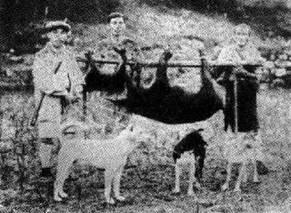
I do not hunt and know very little about hunting but I
understand that hunters use different breeds of dog for
different topographies and targets. Mr. Ichihara says that
shiba-inu is best suited for hunting copper pheasants in
mountains. He does not recommend using shibas for flushing
pheasants in an open field for safety reason. Shibas are best
when used one to one with a hunter and they do not perform
as well in a group.
understand that hunters use different breeds of dog for
different topographies and targets. Mr. Ichihara says that
shiba-inu is best suited for hunting copper pheasants in
mountains. He does not recommend using shibas for flushing
pheasants in an open field for safety reason. Shibas are best
when used one to one with a hunter and they do not perform
as well in a group.
In 1994, Mr. Ichihara acquired 50 days old shiba pup. He
named this red bitch "Koro". Koro was not an easy pup to
train and he could not call her back very well until she was
full one year old. On several occasions he had to leave her in
the mountain and retrieve her the next day. Otherwise, she
had a very good quality to be an excellent hunting dog,
easily maneuvering in and out of bushes and streams. By the
time Koro was three years of age, she became a wonderful
companion for Mr. Ichihara in the mountains of Tanzawa.
named this red bitch "Koro". Koro was not an easy pup to
train and he could not call her back very well until she was
full one year old. On several occasions he had to leave her in
the mountain and retrieve her the next day. Otherwise, she
had a very good quality to be an excellent hunting dog,
easily maneuvering in and out of bushes and streams. By the
time Koro was three years of age, she became a wonderful
companion for Mr. Ichihara in the mountains of Tanzawa.
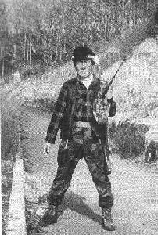
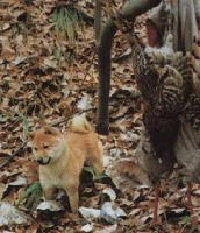
One typical winter day in the mountains of West Tanzawa,
Mr. Ichihara let Koro out of the car at about 10 a.m. In ten
minutes, they are at the mouth of a gorge leading to a
mountain stream. Soon Koro began to take scent, keenly
observing left upper side of the stream, quietly squeaking
her nose. Mr. Ichihara readies his gun and keeps his eyes on
Koro. Koro rushes into thick green bushes, rapidly climbing
the mountainside. From a bush 20 to 30 meters ahead a male
copper pheasant is flushed and Koro is barking in high-
pitched shiba yelp. Koro always let Mr. Ichihara knows that
a game is flushed by barking giving him a chance to take a
shot even if Koro is not in sight.
Mr. Ichihara let Koro out of the car at about 10 a.m. In ten
minutes, they are at the mouth of a gorge leading to a
mountain stream. Soon Koro began to take scent, keenly
observing left upper side of the stream, quietly squeaking
her nose. Mr. Ichihara readies his gun and keeps his eyes on
Koro. Koro rushes into thick green bushes, rapidly climbing
the mountainside. From a bush 20 to 30 meters ahead a male
copper pheasant is flushed and Koro is barking in high-
pitched shiba yelp. Koro always let Mr. Ichihara knows that
a game is flushed by barking giving him a chance to take a
shot even if Koro is not in sight.
Koro stays within 30 to 50 meters of Mr. Ichihara and do
not go very far letting him walk slowly enjoying the scenery
and hunting at leisure. Some times when Koro goes over the
ridge chasing a game, Mr. Ichihara would waits for her
upstream and soon Koro will return tracing his scent. When
she cannot find the scent, she would howl for help from Mr.
Ichihara.
not go very far letting him walk slowly enjoying the scenery
and hunting at leisure. Some times when Koro goes over the
ridge chasing a game, Mr. Ichihara would waits for her
upstream and soon Koro will return tracing his scent. When
she cannot find the scent, she would howl for help from Mr.
Ichihara.
When Koro takes the scent of a copper pheasant, she busily
uses her nose and ears. If the pheasant moves even an inch,
Koro stops with her ears pointing toward it and tail slightly
dawn, dashing immediately towards the game, flushing it for
a shooting chance. Because Koro dashes very quickly, the
game is often surprised and some times forced to perch at a
near by tree making it an easy pray.
uses her nose and ears. If the pheasant moves even an inch,
Koro stops with her ears pointing toward it and tail slightly
dawn, dashing immediately towards the game, flushing it for
a shooting chance. Because Koro dashes very quickly, the
game is often surprised and some times forced to perch at a
near by tree making it an easy pray.
Mr. Ichihara and Koro reach top of a ridge by about 11 a.m.
After a short rest, changing under-shirt and watering Koro,
Mr. Ichihara noticed Koro pausing keenly with ears pitched
forward and tail down a little, ready to dash toward a falling
tree between a Japanese cedar and an oak. Mr. Ichikawa
leveled his gun and gave Koro a verbal sign to flush. As soon
as Koro flushes, a male copper pheasant fly to his right with
a squeaking sound. The pheasant was put down with a single
shot.
After a short rest, changing under-shirt and watering Koro,
Mr. Ichihara noticed Koro pausing keenly with ears pitched
forward and tail down a little, ready to dash toward a falling
tree between a Japanese cedar and an oak. Mr. Ichikawa
leveled his gun and gave Koro a verbal sign to flush. As soon
as Koro flushes, a male copper pheasant fly to his right with
a squeaking sound. The pheasant was put down with a single
shot.
Koro uses her nose and ears very effectively and finds a
game without wasteful movements. When she dashes
towards a game it is flushed 100 percent of the time. Mr.
Ichihara and Koro have learned to be a perfect hunting
partner, enjoying a slow hike up the mountain streams,
taking things easy, and cherishing a quiet companionship.
game without wasteful movements. When she dashes
towards a game it is flushed 100 percent of the time. Mr.
Ichihara and Koro have learned to be a perfect hunting
partner, enjoying a slow hike up the mountain streams,
taking things easy, and cherishing a quiet companionship.
Mr. Ichihara insists that shibas should be both good hunting
dog and good looking. Koro was mated with a Nippo show
winner Tengu no Ginryu and another fine hunting shiba, "
Chibi", is produced. Mr. Ichihara is currently using both
Koro and Chibi, some times mother and daughter in a pair.
It is interesting to note that his friend in Wakayama is using
Chibi's littermate for hunting wild boars with a great
success. Mr. Ichihara says that when breeding for both type
and hunting instinct, at least dam should be a proven bitch
to maintain the hunting instinct of off spring. He believes the
advantages of shiba- inu over other breeds are excellent
ability to take scent, good hearing, and nimble movement in
the bushes of a steep mountain. He also mentioned that not
all shibas are good hunting dog and a patient training is
required to bring out the innate ability of a chosen few.
dog and good looking. Koro was mated with a Nippo show
winner Tengu no Ginryu and another fine hunting shiba, "
Chibi", is produced. Mr. Ichihara is currently using both
Koro and Chibi, some times mother and daughter in a pair.
It is interesting to note that his friend in Wakayama is using
Chibi's littermate for hunting wild boars with a great
success. Mr. Ichihara says that when breeding for both type
and hunting instinct, at least dam should be a proven bitch
to maintain the hunting instinct of off spring. He believes the
advantages of shiba- inu over other breeds are excellent
ability to take scent, good hearing, and nimble movement in
the bushes of a steep mountain. He also mentioned that not
all shibas are good hunting dog and a patient training is
required to bring out the innate ability of a chosen few.
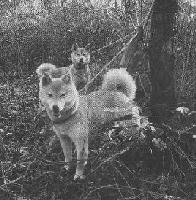
I repeated time and again in my earlier articles that shibas
are originally a hunting breed and it is important to
maintain such qualities when breeding for true type of
shibas. The Nippo standard clearly indicates this point and
consider it an essential part of shiba-inu. Kan-I and Ryousei
are significant aspects of hunting qualities.
are originally a hunting breed and it is important to
maintain such qualities when breeding for true type of
shibas. The Nippo standard clearly indicates this point and
consider it an essential part of shiba-inu. Kan-I and Ryousei
are significant aspects of hunting qualities.
After seventy years of the establishment of Nippo (the
Association for Preservation of Japanese Dogs), the original
intention of preservation of once endangered breed can be
announced as a sounding success. Now, shibas can be found
anywhere in Japan and Kennel Clubs around the world
recognize the breed. In spite of the amazing increase of
shibas in Japan and other parts of the world, I wonder what
the pioneers of Nippo would say about the quality of shibas
today. I must confess that I have an uneasy feeling and
remorse that shibas today are not the shiba-inu the early
Nippo members intended to preserve. It is obvious to me
that over the years, so-called modern shibas have lost many
essential characteristics that make shiba-inu a good hunting
dog.
Association for Preservation of Japanese Dogs), the original
intention of preservation of once endangered breed can be
announced as a sounding success. Now, shibas can be found
anywhere in Japan and Kennel Clubs around the world
recognize the breed. In spite of the amazing increase of
shibas in Japan and other parts of the world, I wonder what
the pioneers of Nippo would say about the quality of shibas
today. I must confess that I have an uneasy feeling and
remorse that shibas today are not the shiba-inu the early
Nippo members intended to preserve. It is obvious to me
that over the years, so-called modern shibas have lost many
essential characteristics that make shiba-inu a good hunting
dog.
The fact that shiba-inu is originally a hunting breed should
be clearly understood by all breeders of true shibas. I hope
the breeders around the world would pause a little and
consider a question, "Do my shibas have the qualities to be a
good hunting dog like their forefathers?"
be clearly understood by all breeders of true shibas. I hope
the breeders around the world would pause a little and
consider a question, "Do my shibas have the qualities to be a
good hunting dog like their forefathers?"
Just a few days ago, my Fumi chased a crow into a bush in
my yard and killed it right in front of my eyes. Fumi was
excited and very happy to hunt down a bird. Perhaps the
crow was stupid or did not think a shiba would attack but I
was happy to see that Fumi had the instinct and ability to
hunt. Fumi is normally a very gentle bitch. I must also
mention that my other shiba, Beni, did not show same kind
of interest in hunting as Fumi. I would be happy to hear
from the readers, your experiences with shiba-inu hunting
in the US or Europe.
my yard and killed it right in front of my eyes. Fumi was
excited and very happy to hunt down a bird. Perhaps the
crow was stupid or did not think a shiba would attack but I
was happy to see that Fumi had the instinct and ability to
hunt. Fumi is normally a very gentle bitch. I must also
mention that my other shiba, Beni, did not show same kind
of interest in hunting as Fumi. I would be happy to hear
from the readers, your experiences with shiba-inu hunting
in the US or Europe.
Following mail was sent to me from Ms. Janice Bannister of
the U.K. It is exciting to hear that shibas in the other side of
the earth is maintaining the essential quality of Shiba Inu.
the U.K. It is exciting to hear that shibas in the other side of
the earth is maintaining the essential quality of Shiba Inu.
Quote
Your article on the shiba as a hunting dog was very
interesting. Although I am surprised that you feel that the
breed could be losing its hunting instinct. My shibas LOVE
to hunt in fact they live to hunt. Every chance they get they
hunt. This overriding instinct is what makes the shiba so
difficult to train to be reliable off the lead. So much so that
the guide lines the Shiba Club here hand out to prospective
new owners is that they do not loose their shibas off lease.
interesting. Although I am surprised that you feel that the
breed could be losing its hunting instinct. My shibas LOVE
to hunt in fact they live to hunt. Every chance they get they
hunt. This overriding instinct is what makes the shiba so
difficult to train to be reliable off the lead. So much so that
the guide lines the Shiba Club here hand out to prospective
new owners is that they do not loose their shibas off lease.
I am one of the few people I know with shibas who lets them
run free and I am careful where I do. They do not
differentiate between wild life and farmer stock! I am lucky
to have some rough woodland near by where they do little
harm. It's overrun with rabbits so they have a good time and
never cease to amaze me with their speed, agility and ability
to go through the densest of bush. I also by coincidence have
a German Pointer, as well as 3 English Pointers. The
German pointer tries his utmost to keep up with the shibas
but he cannot compete through bush and hillside. They can
get where he can only stand and watch. The English
Pointers don't like bush country ? they have very thin skin
so thorns and Brambles hurt them, but they excel on
moorland.
run free and I am careful where I do. They do not
differentiate between wild life and farmer stock! I am lucky
to have some rough woodland near by where they do little
harm. It's overrun with rabbits so they have a good time and
never cease to amaze me with their speed, agility and ability
to go through the densest of bush. I also by coincidence have
a German Pointer, as well as 3 English Pointers. The
German pointer tries his utmost to keep up with the shibas
but he cannot compete through bush and hillside. They can
get where he can only stand and watch. The English
Pointers don't like bush country ? they have very thin skin
so thorns and Brambles hurt them, but they excel on
moorland.
I have seen 2 amazing hunting incidents with shibas, both
involved the same bitch. The first happened one day whilst
out walking. I came across a man hunting rabbits with nets,
4 lurchers and 2 terriers (lurchers are Greyhound X's in
case you don't have them in Japan). One rabbit broke free
and ran across open ground, quickly pursued by the man's 4
lurchers. My shibas joined the chase, they had a good 30 ?
40 meter start over her, she not only caught up but over
took them, eventually catching and killing the rabbit. The
man's face was a picture I'll never forget and he walked
with me for the rest of my walk demanding to know where
he could get such a dog!
involved the same bitch. The first happened one day whilst
out walking. I came across a man hunting rabbits with nets,
4 lurchers and 2 terriers (lurchers are Greyhound X's in
case you don't have them in Japan). One rabbit broke free
and ran across open ground, quickly pursued by the man's 4
lurchers. My shibas joined the chase, they had a good 30 ?
40 meter start over her, she not only caught up but over
took them, eventually catching and killing the rabbit. The
man's face was a picture I'll never forget and he walked
with me for the rest of my walk demanding to know where
he could get such a dog!
The second incident happened on open ground on a disused
airfield. The same bitch was scenting through the long grass
when she sprung 2 hares, she caught one before it got 10
meters, she killed it cleanly, by which time the other had a
good start but she gave chase and quickly caught the second
one too. Hares are normally 'coursed' by Greyhounds and
lurchers as other breeds are considered too slow and lack
the mobility to out run a hare ? but then the shiba is a well
kept secret in Britain!
airfield. The same bitch was scenting through the long grass
when she sprung 2 hares, she caught one before it got 10
meters, she killed it cleanly, by which time the other had a
good start but she gave chase and quickly caught the second
one too. Hares are normally 'coursed' by Greyhounds and
lurchers as other breeds are considered too slow and lack
the mobility to out run a hare ? but then the shiba is a well
kept secret in Britain!
Unquote
What a shiba! Thank you Janice for sharing your
experience.
experience.
Birgit Hillerby from Sweden wrote and said that her shiba
was able to get rid of rats, which had been a nuisance for a
long time in her stable. Apparently the shiba was put in a
good use! She also sent this wonderful picture of Tenkuu no
Tetsu, Yokohama Atsumi in training for boar hunting in
Sweden. I am happy to learn that given a chance, shiba-inu
can still be a good hunting dog. It may be that here in Japan
shibas are kept mostly in the cities and such environment is
the worst enemy for the future of shibas.
was able to get rid of rats, which had been a nuisance for a
long time in her stable. Apparently the shiba was put in a
good use! She also sent this wonderful picture of Tenkuu no
Tetsu, Yokohama Atsumi in training for boar hunting in
Sweden. I am happy to learn that given a chance, shiba-inu
can still be a good hunting dog. It may be that here in Japan
shibas are kept mostly in the cities and such environment is
the worst enemy for the future of shibas.
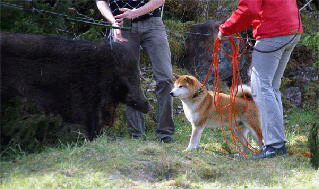
|
